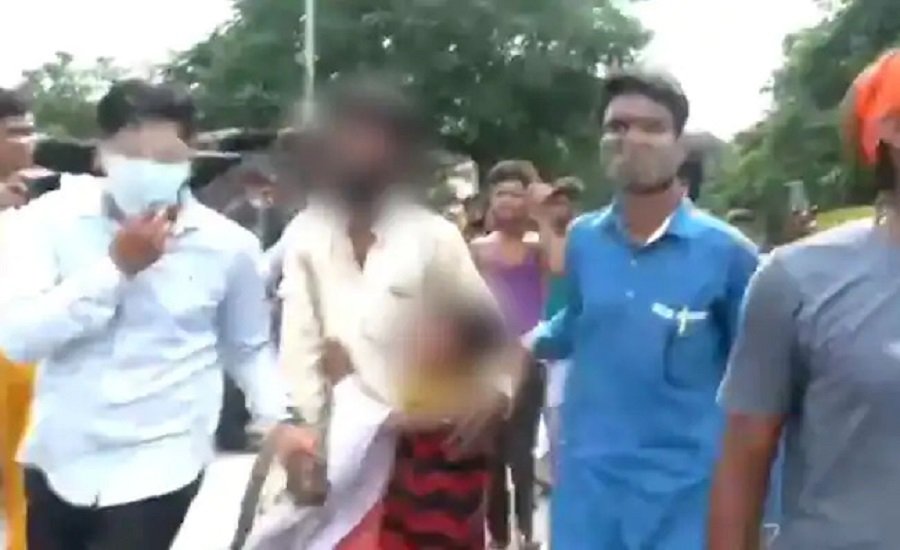
India needs a law on the patterns of the SC/ST Act 1989 so that insult on account of religion is punishable, says former DGP of Kerala N. C. Asthana
Zafar Aafaq | Clarion India
NEW DELHI — The horrific video of a Hindutva mob attacking a Muslim man in UP’s Kanpur while his daughter pleads for mercy has sparked massive outrage particularly on social media forcing the police to take action; A case was registered on the complaint of 45-year-old victim Absar Ahmad. Following this three men were arrested including a member of Vishwa Hindu Parishad on Thursday.
But just within 24 hours all the three were released on bail by police citing that as per court guidelines they could not be sent to jail since the sections invoked against them would lead to jail terms of only less than seven year if found guilty. The release came hours after supporters of extremist outfit Bajrang Dal held a protest outside the office of Deputy Commissioner of Police (DCP) seeking release of the three men. They chanted ‘Jai Shree Ram’– a slogan that has become a rallying cry for targeting helpless Muslims.
The quick release of accused despite committing a crime which the activists say was not only a physical attack for his Muslim identity but also “outraged the dignity of the victim” renewed calls for a law that specifically addresses the hate crimes such as hate speech, mob violence including lynching targeting minorities particularly Muslims.
Reacting to the Kanpur mob attack and the subsequent bail, Dr. N. C. Asthana, a retired IPS officer and a former DGP of Kerala, said in a Tweet that to address the problem of religion-based hate violence India needs a law “on the patterns of the SC/ST Act 1989 so that insult on account of religion is punishable”.
Speaking with Clarion India, Dr Ashthana said: “In the absence of a law for this (hate crimes against religious groups) the police were right in using 323, 504, etc. But imagine the haplessness of the girl watching her father being assaulted and forced to chant Jai Shri Ram. The trauma suffered has to be compensated by the law. Once you have the law and the police do not apply it, the fact can be argued in the court. Even the SC judgment in Kishanbhai can be invoked to get them punished.”
Rights activists and experts say a law curbing hate speech and violence targeting minorities will offer a chance to the victim to seek justice for the hurt caused to him for his religious identity.
Prof. Apoorvanand said that such a law “may not remove hatred from the hearts of the people but it will offer a sense of protection” to the potential victim.
He said “hate speech in itself is a violence as it injures the dignity of the victim besides leading to physical violence.”
In 1989, the Parliament enacted a law Scheduled Castes and Tribes (Prevention of Atrocities) Act, 1989 to prevent atrocities including discrimination committed against people belonging to the lower strata of the Hindu social hierarchy.
Crimes targeting Dalits and tribal people on account of their communal identity are addressed under this law. The Act has to some extent put a check on the discrimination and violence faced by the Dalits and tribal people even though rights activists say that people holding prejudice against them have found ways to abuse.
But legal experts say that Indian Penal Code (IPC) does not address the problem of hate crimes targeting members of religious communities. The police invoke Sections like 153-A, 323, 504 or 295-A of the IPC to file cases in incidents of communal nature.
They say the hate and violence against Muslims is a social and political problem but the government treats it as a law and order issue and needs to be addressed by bringing structural changes.
A group of lawyers has also filed a petition in the Supreme Court seeking a recognition of the ‘duty of care’ of public authorities to prevent hate speech targeting religious minorities.
Both Dr Asthana and Apoorvanad agree that law alone cannot fix the problem but, “when nothing else is working, let us have the law at least”.
But Asthana also admits that even with a law eventually enforcement is with the police. “If they are unfair, little can be done.”

